- Serbia
Get to know Serbia
- Citizens
Culture and science
Health services
Pension and disability insurance
- Business
Employment
Economy
- Media
- Government
- Contact
Keep in touch
Contact form
Back
Keepin touch
Whether you have a question, comment, suggestion or any problem in the purview of the government, send us your message and we will try to respond as soon as possible. If your problem is not in our purview, we will forward your message to the relevant institution.
Q:
A:
Details of textile trade agreement harmonised
Brussels,
11 June 2004
Delegations of Serbia-Montenegro and the European Commission have harmonised all details of the future agreement on trade in textile products, said Serbian Assistant Minister of International Economic Relations Ana Blagojevic, who is heading the Serbia-Montenegrin delegation at the negotiations in Brussels. Blagojevic said that the agreement is expected to be initialed after both parties complete necessary procedures.
The European Commission said that the signing of the agreement will depend on the results of the check of origin of sugar exported from Serbia into the EU, before the EU introduced a ban on importing sugar from Serbia.
During two-days talks in Brussels, which commenced yesterday after a several-month delay, the Serbia-Montenegrin delegation requested that the issues of export of textile and sugar be separated, since a new customs regulations was put into place early this year.
The European Commission accepted objections of the Serbia-Montenegrin delegation to the previous text of the textile agreement, and approved the extension of deadline for reducing customs duties for textiles from the EU, as well as provisions which allow for unimpeded accession to the World Trade Organisation and the EU.
According to the draft agreement, the EU should fully open its market for textiles and clothes made in Serbia-Montenegro and abolish customs duties and quotas.
At the proposal of the Serbia-Montenegrin delegation, EU representatives agreed to consider increasing import quotas for textile products from Serbia-Montenegro until the trade agreement has come into force.
During two-days talks in Brussels, which commenced yesterday after a several-month delay, the Serbia-Montenegrin delegation requested that the issues of export of textile and sugar be separated, since a new customs regulations was put into place early this year.
The European Commission accepted objections of the Serbia-Montenegrin delegation to the previous text of the textile agreement, and approved the extension of deadline for reducing customs duties for textiles from the EU, as well as provisions which allow for unimpeded accession to the World Trade Organisation and the EU.
According to the draft agreement, the EU should fully open its market for textiles and clothes made in Serbia-Montenegro and abolish customs duties and quotas.
At the proposal of the Serbia-Montenegrin delegation, EU representatives agreed to consider increasing import quotas for textile products from Serbia-Montenegro until the trade agreement has come into force.
-
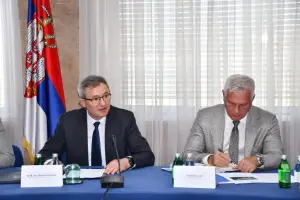 Belgrade, 27 October 2025
Belgrade, 27 October 2025Construction of Selova dam of vital importance for southeast Serbia
-
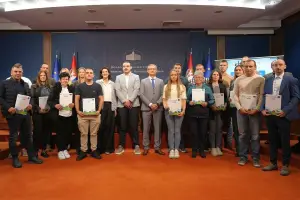 Belgrade, 22 October 2025
Belgrade, 22 October 2025First 19 resolutions awarded under IPARD III for procurement of new tractors
-
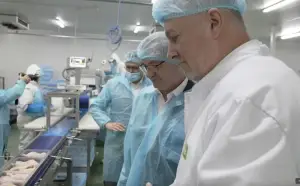 Šid, 21 October 2025
Šid, 21 October 2025Superior Foods example of successful Serbia-Hungary cooperation
-
 Belgrade/Washington, 17 October 2025
Belgrade/Washington, 17 October 2025Confirmation of Serbia’s position as attractive investment destination
-
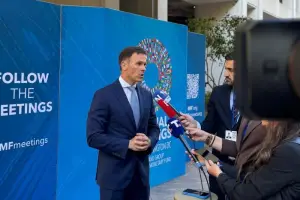 Belgrade/Washington, 16 October 2025
Belgrade/Washington, 16 October 2025Serbian economy maintains stability amid global challenges
-
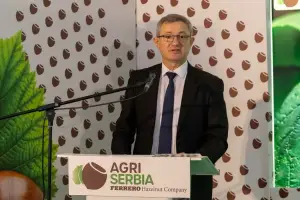 Sombor, 14 October 2025
Sombor, 14 October 2025Agriculture one of major pillars of bilateral cooperation with Italy
-
 Belgrade, 13 October 2025
Belgrade, 13 October 2025First IPARD III resolutions on support to farmers presented
-
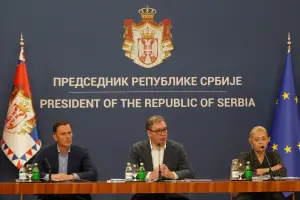 Belgrade, 21 September 2025
Belgrade, 21 September 2025Solution for legalisation of 4.8 million properties by year’s end
-
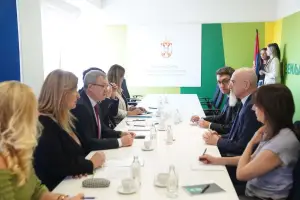 Belgrade, 19 September 2025
Belgrade, 19 September 2025Strong potential for Italian investments in Serbia’s processing sector
-
 Belgrade, 17 September 2025
Belgrade, 17 September 2025Serbia committed to building strong economic ties with Russia
